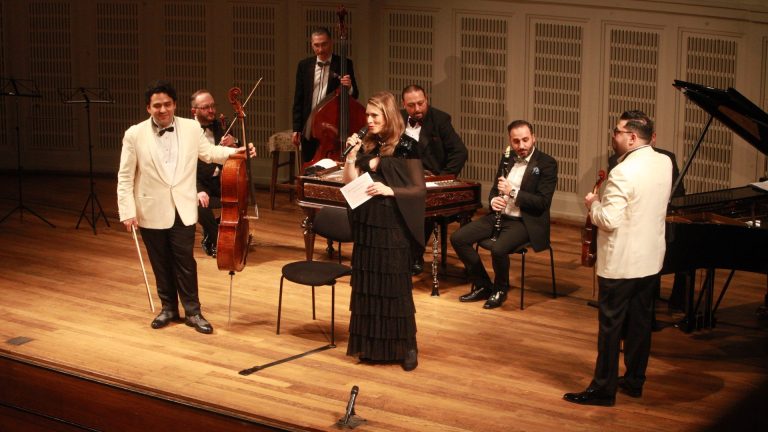On December 30, the Jávorkai Brothers (violinist Sándor and cellist Ádám) hosted a rousing musical kaleidoscope, entitled “From Budapest with Love,” at the Vienna Konzerthaus. The love expressed that evening was as if Santa Claus had gifted us with his secret stash of vinyls from the past.
There was lots of love to go around, and the audience was as much the giver of that love as the performers: judging by the public’s boisterous reaction (unlike most Austrian audiences), the Jávorkais have a devoted following in this city.
And there’s a good reason. Their unusual program on this pre-New Year’s Eve offered 22 music selections by 19 composers, performed by the duo and their colleagues Gergely Boncsér (tenor), Annamari Dancs (soprano), Veronika Kopjova (piano), Arabella Fenvyes (soprano, MC), a trio of violinists, a brother-sister piano duo, and a specialty orchestra of five players.
The whole experience was a panoply of Csárdás, film scores, Hungarian rhapsodies, opera, operetta, and famous dance music, but mostly a dare-devil string show in which the Brothers fired off zillions of notes with ferocious flare in Gypsy classics alongside skillful interpretations of some more serious pieces.
In between the selections was plenty of repartee, jokes, interviews, information, anecdotes, and even a Marx Brothers / Igudesman & Joo flavored comedy skit where Sándor created hilarious squeaks with a mini-bow drawn across a mini-violin.
On the serious side, lesser-known solo gems “The Last Rose of Summer” by Heinrich W. Ernst and Paganini’s “Moses Variations” performed by Ádám and Sándor, respectively, revealed their awesome bowing technique and easy acumen – and all pieces were performed from memory. The equally awesome accompanist for all the classics of the evening was pianist Kopjova.
Fenyves, in addition to her onstage hostess duties, also gave a memorably lovely performance of two songs from films (Nino Rota’s “Love Theme” from “Romeo and Juliet;” and Ennio and Andrea Morricone’s wordless song from “Once Upon a Time in the West”). Dancs and Bonscér’s duet from Kálmán’s “Die Csardasfürstin,” as well as Dancs’ solo “Die Julischka aus Budapest” by Fred Raymond, gave the audience a delicious taste of Hungarian operetta.
As the first winners of Classicalia’s new online music competition for students, 9-year-old Alexander and Sophie Wagner performed duo-piano arrangements of Yiruma’s “River Flows in You,” and Hans Zimmer’s music for the film “Pirates of the Caribbean.” This brother-sister duo displayed an astonishing level of musicianship and technical command.
The Vienna Virtuos Chamber Orchestra — István Fehér (cimbalom), László Ökrös (clarinet), József Ökrös (bass), Ferenc Oláh (viola), and Kálmán Csiki (piano) — was more or less a permanent fixture onstage, as they also accompanied the Jávorkais and were the central focus of the many Csárdás numbers. Pianist Csiki’s sophisticated accompaniments for several soloists were outstanding.
In many ways, this concert was a fascinating lesson about what the Csárdás actually is: a specific genre with a long history and tradition, and a genre that has a specific musical format. Above all, it’s Hungary’s gift to the world. And for this New Year, to all of Vienna.











